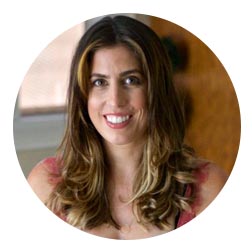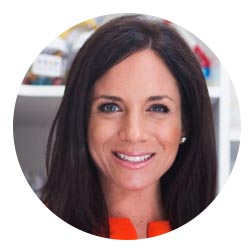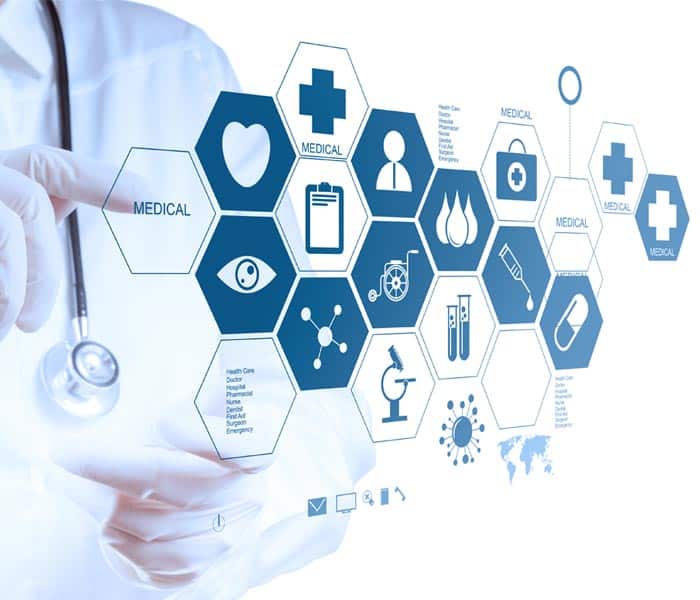There have been so many nutritional breakthroughs in the past and currently happening in the present. When once upon a time fat was considered society's enemy number one, today, good fats are actually recommended as part of a healthy diet.
Eat the avocados, the nuts, the olive oil. Many years ago, this would have been unthinkable. Sugar is present in almost all of our foods, however, today's science shows the many harms of sugar on one's body so people stay away from processed sugar.
What about fasting? Studies show that fasting is actually good for your body and can be a great incorporation as part of a diet program to lose weight.*
But what about the future?
Do you wonder if all breakthroughs have been discovered or are there any more for us to discover? What will we learn about our diet and the food industry in the near future?
We reached out to 11 experts who shared their opinions and concerns with us on the following question: what nutritional breakthroughs do you believe will happen in the future that people consider as impossible or unlikely at the moment?
Keep reading to find out how they access the situation and what their big thoughts are for our future.
* If you have diabetes or any other chronic condition, always consult with your doctor before getting on any diet programs or attempting to fast. Following diets on your own without supervision may do you more harm than good*
[accordions id="15918"]
1. Gisela Bouvier, MBA, RDN, LDN

- Intuitive Eating: Although intuitive eating is not a new science, it is still not accepted by many people as a "healthy' way to live. Most individuals are so disconnected from their hunger cues and being mindful, that they cannot understand how we can eat food - the food that our bodies desire - when we are hungry and stop eating when we are full. The concept of "all foods fit" is a very difficult concept to grasp. Many people seeking to lose weight or improve their health believe that they need to be "on a diet" or follow a rigid plan that either makes them eat too little, too much, or simply eat foods not to their liking. Currently, teaching clients about how to be mindful when eating and how to be intuitive about their hunger cues is a great task because of there is too much emphasis in the media about "diet," and not enough emphasis on hunger and satiety. As dietitians and health professionals continue to promote and educate about intuitive eating, the more our clients and others will begin to learn it.
- Home-Made Enteral Nutrition: As a former Clinical Dietitian, I know every macronutrient of every enteral nutrition formula on the market. However, there has been a growth on the amount of patients being fed with enteral feeds being made at home. Many patients, particularly their families, are seeking to consume wholesome natural nutrition via their feeding tubes. Patients (or their families) want to "eat" the same way as others do and benefit from the nutrients that fruits, vegetables, complex carbohydrates, and lean proteins provide, instead of laboratory made nutrition. There is currently little medical support and resources for those following home-made regimens. However, as more patients desire to be nourished as others are and the benefits of fresh food continue to be promoted, home-made enteral nutrition will become more common and more support will be provided to ensure adequate nutrition regimens for each patient.
- Less Convenience Foods: Too many people have poor health, which may have been greatly contributed to having poor diets from eating processed, unnatural, and pre-packaged foods. More and more people and food companies are becoming aware of the harm processed foods can have to our health. As education for the need for wholesome and natural nutrition continues to grow, there will be more individuals making the dietary changes they need to stay healthy and the less convenience foods will be needed.
2. Girlene Coughlin, RDN, CPT

I believe that one of the biggest breakthroughs that will happen in the future that people consider as impossible or unlikely at the moment is that more Medical Doctors, of all of specialties, will actually know more about Nutrition and healthy cooking, and will be able counsel their patients about it more thoroughly.
Nowadays, many MDs and even DOs (Doctors of Osteopathy) give recommendations to patients by eliminating food groups because these doctors claim they are too busy to explain to patients what foods they should add to their daily diet and what foods should be avoided. Once, a nephrologist told one of my patients to avoid all soups. When questioned whether there was a reason why homemade, low-sodium soups, with the ingredients that the patient was allowed to use were also to be avoided by that patient, the nephrologist then explained that “it was just easier to tell the patient to avoid all kinds of soups, than to explain to her that she could have homemade soups with wholesome ingredients.”
We as dietitians should also understand and accept that when medical doctors explain a healthy diet or specific foods a patient should add or remove from their daily diet, they are actually not doing the dietitian's job, but they are explaining more thoroughly what a patient should or not be eating than most of them explain now. The dietitian will still have to assess and counsel the patient according to their individuality, but they won't have to ask the doctor why an entire food category or food group was removed from a patient's diet.
I see many more medical schools offering healthy cooking classes to students, and I believe in a future generation of medical doctors that will know more about nutrition and healthy cooking and they'll be able to counsel a patient within their scope of practice, and do a good job doing so. For example, a nephrologist will be able to counsel a renal patient to “add the vegetables from the safe potassium and phosphorus list to a homemade, low-sodium soup, if you'd like to cook a homemade soup”.
3. Jeanette Bronee, CHHC, AADP

"The breakthrough that I hope will happen is that we become primarily, or even completely plant-based eaters.
With the extreme focus on avoiding carbs, instead of educating about which carbs to avoid and which to include (plants) the recommendation has been to eat more protein, but with that we have also become excessive meat eaters and most do not know that plants also provide protein.
Our food resources are such an important element of our well-being and food used to be our medicine, today we need medicine to counter the effect of the foods we eat. Hopefully food will be our medicine again.
If we could stop eating packaged, processed and refined food and only eat whole and real food, if we could get back to cooking our food and spend time on preparing and eating our food, our health would change and we would feel in charge of not only our daily well being, but our future health and wellness as well."
4. Nan Allison, MS, RD, LDN

I believe there are two areas in which emerging research will lead to a revolution in not only nutrition therapy and nutrition guidance for day to day eating, but how medicine is practiced: genetics and our microbiome. Individuals will tested for their genetic profiles to guide not only food choices, but eating patterns. Also many of us will be assessed for our intestinal microbiome profile and traditional treatments for diseases will be augmented or replaced by bacterial therapies and supported by nutrition targeted to one's genetic profile. This may change how we view and interact around food socially and emotionally.
5. Brynn McDowell, RD

I believe in the future, that we will see a shift in the price points of wholesome, healthy foods compared to quick, processed junk foods. I believe that as more and more people learn about nutrition that people will get involved to try and make healthy food items and ingredients much more budget friendly. On the counterpart, I also believe that this will in turn back overly processed junk food less cheap. Supply & Demand dictates a large part of commerce, so I hope in the future we will see fresh vegetables, fruits and lean proteins cost less than chips, cookies, and fast food.
6. Joanna Hunter, RDN

Nutrigenomics "you are what you eat":
We live in a very exciting time in terms of technological and healthcare advancements. The health and nutrition field is no different! As scientists and researchers learn more about our genetic make up and how food effects our DNA we have seen advancements in the relatively new field of “Nutrigenomics" . It may seem unlikely today, but as we look to the future there is a possibility we will be able “eat for our genes”.
Breakthroughs in this field would allow Dietitians to cater their meal plans to specific individual genetic expressions.
This could possibly impact not only the every day health of the individual, but also could help ward off disease linked to our family history like certain cancers, diabetes and obesity. Instead of healthcare professionals giving more wide sweeping recommendations like "eat more vegetables" we would be able to say exactly what types of foods each person would need to eat to thrive. As we look to the future the possibilities are endless and I for one am very excited to see what other nutritional breakthroughs are waiting for us when we get there.
7. Jason Mousel, MS RD

Our current medical system is structured to treat disease and pays too little attention to prevention. As a result we see steadily increasing rates of chronic diseases like diabetes, heart disease, stroke and some cancers. What if there was a simple, inexpensive solution that could reverse these trends? There is, and it is food. I envision a future where food is our primary approach to creating a healthy population and treating disease; where food is our medicine. This future requires some radical changes in the way we think about medicine and the way we relate to food. In this future:
- We no longer view food primarily as entertainment, instead our meals are enjoyable nourishment for our bodies, minds, communities, and environment.
- Primary care facilities teach patients how to eat, doctors prescribe produce instead of pills.
- We experience the balance and ease of enjoying nourishing food: more energy, better mood, less cravings, improved sleep, less guilt, a more active life, and a deeper satisfaction from aligning our meals with our values.
- Food is a way to take an active role in our own health care, instead of relying on medication with side effects that don't usually cure our conditions.
This whole food revolution is possible, but it requires a major shift in our thinking and how we live our lives. We need to prioritize cooking and create time for food prep so we are no longer reliant on convenience foods and corporations to feed us. This change will be difficult, it will require effort but it is a path to freedom and improved health. How can we not take this path when the option is disease, medication, and ultimately, suffering?
8. Mor Levy, R.D.N., I.B.C.L.C., M.S.

The ability of the gut flora (bacteria in your intestines) to influence your health more than your own genetics, including your weight. I think the new found research on gut flora and immune system will surprise and change the health world in many ways! Everything in your body is connected, that is what people need to realize.
9. Erica Leon, RD

I truly believe that we will find out much more about our gut, and the role it plays in our mental and physical well-being. There is significant research going on now about the role of the intestinal microbiome, and I do believe that answers to some of our questions about the persistence of eating disorders, development of certain types of cancers and more will be discovered in this manner.
The field of personalized nutrition, based on our genetics, is also on the horizon. I think we will find that we each have an optimal way of eating that will maximize our health and longevity. I also envision a world with no diabetes. I like to think that we will have vaccines to prevent the development of certain types of diabetes.
10. Lara Field, MS, RDN

I believe more consumers will consider fast food as poison for their bodies. Knowledge is power, and similar to the movement against smoking, I think more consumers will desire to protect their bodies by eating more healthful foods. French fries, processed meat products, cheap refined grains, loaded with preservatives, will turn people away in the future. Sure, there will always be a subset of consumers that will make this choice, that is why smoking hasn't been completely abolished. However, I do believe more people will choose health in the future.
11. Noel Aldrich, PhD, CNS

The nutritional breakthrough that will happen in the future is the understanding to grow nutrient dense vegetables that will meet the nutrition needs of the population and taste great. The human race is now beginning to understand a little bit of the human genome and the critical effect quality nutrition has on proper function of our genes. Personalized health is the current trend matching an individual's genetic information with the nutrient needs associated with the personal genetic makeup. Currently, this tends to foster increased supplement intake. However, I am interested in helping individuals learn what foods will improve their health. Therefore, how to grow nutrient dense vegetables is a critical breakthrough waiting to happen.
There is research progressing toward the ideal soil health that will promote greater vegetable nutrient content. This research is focusing on the mineral content and micro-organism content of the soil. This research is not dependent on the next genetically modified organism breakthrough. The majority of GMO research does not focus on improved nutrient content, but on the ability to survive chemical applications. The research I am watching is among those agriculturalists and horticulturalists who are studying to understand the healthiest soils that will produce the most nutrient dense produce. There is preliminary evidence confirming the increased nutrient density of the produce and the improved taste of nutrient dense produce resulting from improved soil conditions.
This nutritional breakthrough will not only serve the greater population for their health, but also improve the environment. As this research expands to more and more local farmers, the local environment will become healthier and my goal for specific whole food sources of nutrition for my clients will be realized.
Current research in this area of soil health is being directed by groups like – High Brix Gardens.
From soil health for promotion of vegetable nutrient to the role of intestinal microbiome to the ability of gut flora influencing our health, I think our experts have covered all the unimaginable topics that we weren't familiar with. In the future, as it is starting to take momentum now, scientists and researchers will learn more about our genetic make up and how food effects our DNA we have seen advancements through the exciting field of “Nutrigenomics".
We hope that you have found this expert round up as educating and exciting as us! Please share your thoughts on their views or you can comment on what you think the next big nutritional breakthrough will be according to you! Have a safe diabetes journey as well!
TheDiabetesCouncil Article | Reviewed by Dr. Jerry Ramos MD and Dr. Christine Traxler MD on June 2, 2020



